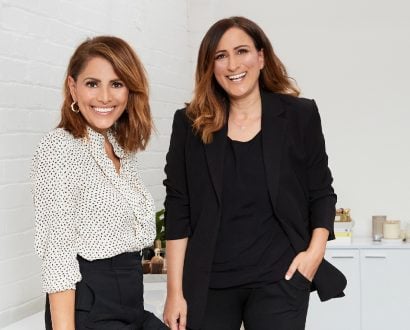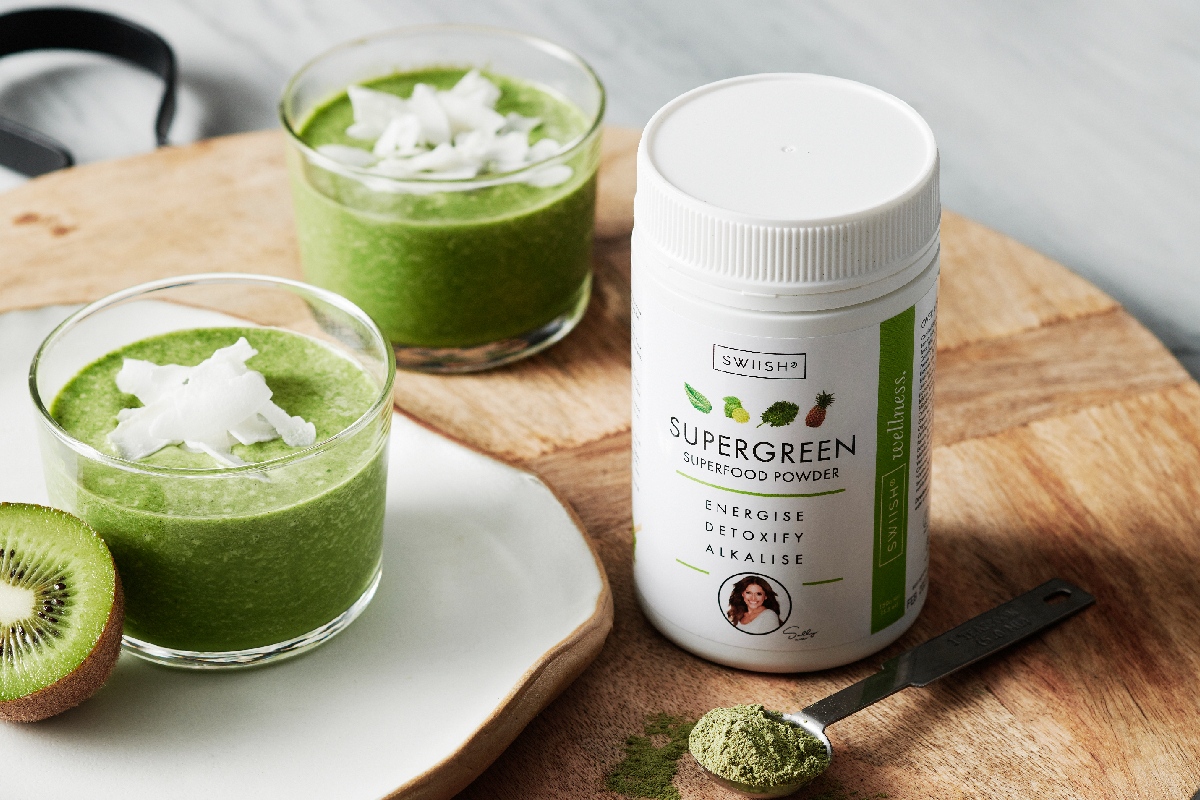How these wellness founders tripled business growth after facing bankruptcy

There aren’t many of us who actually accomplish our childhood dreams, but wellness luminaries Sally Obermeder and Maha Corbett have done just that.
Long gone are the school holidays spent passing empty manila folders back and forth, now the sister duo does it for real at SWIISH, sharing expert wellness and health guidance for people to shine with their best lives.
From the nutrient-dense wellness powders (which target concerns including sleep, energy, skin and immunity) and clean beauty to affordable fashion and recipe books bursting with simple yet delicious meals, the Co-Founders effectively tackle areas that benefit overall vigour without skimping on taste or efficacy. And it’s their lived experience that truly sets the business ingenuity apart.
Diagnosed with an aggressive form of breast cancer just a day before her daughter was born, Obermeder faced the toughest fight of her life – but with it came the seed of an idea for SWIISH.
"Those early business days were full on," Obermeder tells The CEO Magazine. "In the beginning you’ve got a million ideas and you’re just trying to see what is actually right for you and your audience."
What started as a blog quickly turned into a wellness destination boasting hundreds of thousands of followers. Founded in 2015, just five years after Instagram was created, the platform allowed the sisters to connect to consumers in a way unlike ever before.
"Instagram gave people an inside look at limited access, which you never had before," Corbett says. "You relied on magazines or newspaper articles, but here was a way to hear directly from people about what they were doing, wearing, eating, where they were going.
"We’ve since recruited people who have reached out to us on Instagram and we only knew of them by their handle."

Using the social media platform, SWIISH was able to build authentic relationships with consumers, propelling the company to new heights.
"People were able to chat directly to the brand, and that didn’t really happen before unless you emailed them via their website," Obermeder explains. "Instagram gave us such instant access and when they took it to the next level and brought in Instagram Live, we essentially had live chats with our customers – that’s just priceless."
After a few years of lucrative growth, the Co-Founders were knocked sideways with a sobering warning: they’d be bankrupt in three months.
Forced to make some hard decisions, the duo fought to turn the business around.
"It was tough," Obermeder recalls. "The good thing about being in business for a few years is it gave us a thick skin and the ability to bounce back – it wasn't the first speed hump we’d come across.
"We fell apart for five minutes, but fortunately we have each other.
"It’s not, ‘We’re going to turn it around’, it’s, ‘We are turning this around and we won’t fail.’ You just get on with it."
And turn it around they did. Since being hit with the grim possibility, Obermeder and Corbett have increased business by 300 per cent.
"It gave us laser-sharp focus," Corbett reveals. "We can’t be across a hundred different things trying to be everything to everyone.
"Everything became clear about what we wanted, what people were seeking from us and what we were delivering them."
Currently in the growth phase of their business journey (where they’re set to release their first Therapeutic Goods Administration-approved supplement later this year), Obermeder and Corbett left their respective careers in television and investment banking human resources to jump full time into the six-year-old company, both bringing a world of unique experiences to SWIISH.
For Obermeder, it’s a rapid-fire ability to consume new information as well as connecting with consumers through presenting via Instagram Live. Meanwhile, Corbett pulls together teams, stays focused and balances the overarching strategy with day-to-day operations. However, there is still plenty to learn as they progress.
"When you’re starting something new, there’s so much you don’t know, which I think is a bit of a blessing," Obermeder shares. "You really just go for what you feel is right.
"Further down the track when you know more, there’s more at stake because you know what can go wrong. Naivety is bliss – you kind of just do it."
Creating a business in the wellness industry
What is wellness?
Considered a modern word, the wellness movement is thought to have started in the 1950s.
Driven by technology and an always-on society, perhaps more than ever people are prioritising their health and wellbeing, seeking solace in what gives them comfort.
"Wellness is living the best way I know how," Obermeder shares. "I want my body to work with me, not against me. It’s making things seamless and much easier, making sure I’m in my body and I feel good – I want to bring my A game to my life.
"Wellness is making sure I have that ability to wake up and be grateful for the day I was given, to enjoy the day I’ve got and then that day becomes multiplied by as many years as you can get. And we want to make that time valuable."
Why is wellness thriving?
"Everything is gradual – I don’t think it’s gone from nothing to everything," Obermeder says. "If I think back to my mum’s time, there was basically her and way above her there was a doctor. Now we’re seeing physiotherapists, chiropractors, nutritionists – you’ve got all these different modalities coming in.
"Of course, we have traditional medicine, but people are now starting to understand they have some control over their wellness.
"People don’t have to wait until they get sick to fix anything. That’s the difference."
How to make a brand stand out
The wellness industry is estimated to be worth US$1.5 trillion, with the potential to grow by up to 10 per cent annually, according to McKinsey.
With so much noise and competition, it can be difficult to stand out in the global market.
The fundamental rule? "Be true to who you are," Obermeder advises.
"The best way to be a brand is to be authentic, and the best way to connect to people is to be real," she says. "The best way to stand out is to listen to your customer – if they say something, they want to be heard."
"SWIISH came from a general desire to help others and really give back, and that sort of truth really comes through," Corbett adds. "That’s 100 per cent the most important thing."
How can entrepreneurs measure success?
"Entrepreneurs are notoriously hard on themselves – it’s always about what they haven’t done, not what they have done," Obermeder points out. "It’s important to acknowledge what they have done.
"Write a little list of achievements and at the end of the year, you’ll look back and see you’ve actually done really well and should be proud of what you’ve achieved."
How to set up for long-term success
"Business is a marathon – burnout can be very real," Corbett says. "As much as you want to get a website up or new product or offering up, you also have to remember you are human.
"If you don’t want to burn out and want to be in it for the long haul, you need to find some ways to make space or find an off button, otherwise you probably will burn out."
How to manage startup finances
"Expect it will take longer to make money or turn a profit," Corbett explains. "Anticipate the hurdles that might happen in manufacturing or with insurances. If you build into that it will take longer to be profitable. Not everything is in your control.
"It’s critical to really know your numbers. Certainly for me, not coming from any finance background, I was always one of those people who thought numbers were boring or that I’m not good at numbers – first, that’s rubbish.
"I worked out pretty quickly it was time to get comfortable with numbers and tackle it head on. But don’t be afraid to bring in expert help.
"Also, have a rainy day fund. Three months of rainy day expenses is good to have as a buffer."
What are the top wellness trends for 2022?
The SWIISH Co-Founders believe sleep will be among the biggest wellness trends for 2022.
"The effects social media has had on our sleep time, the mental load and as life has become more demanding and more stressful, it creates more anxiety," Obermeder says. "The effect on sleep is going to be the number one topic in the next few years.
"People will start to understand that a great day actually starts the night before with a good night’s sleep. Sleep is the factor to overall wellness."
Additionally, attention towards corporate wellness is growing.
"The times have changed with how we’re working," Corbett adds. "Corporate wellness is set to take off.
"For some organisations it’s come about because of COVID-19, because we’re working from home more, and there’s more of an understanding around why people stay in jobs and why they leave them.
"Generally, we’re not disconnecting from our phones or emails like we were 20 years ago, so there isn’t really an off switch and I think employers are starting to realise this."
What should people avoid?
"Guilt," Obermeder says. "That’s a big one. It’s a dreadfully draining emotion. Wellness isn’t just about what you put in your mouth, it’s about what you feed your mind – it’s all part and parcel."